Wednesday, November 09, 2016
Evening, November 8, 2016
Fair Trade
Gary Soto
I did my best when I was young
just married, walking my love
From one room to the next.
I was living in my madness--
The traffic inside
My head while outside
Our downtown apartment, vatos
Cruised with blue tatoos...
I walked my wife from
One sun-lit room to the next,
And on a dead Sunday
I walked her to the Azteca Cafe,
Slum eating, rags
of chicken wings, lumpy gravy,
The anemic coins
Of carrots. My money,
Then, was dollar bills
That tumbled through the wash
And coins warmed by sunlight
On the chest of drawers.
Money is what gave me
A plate of chicken,
Steam like a glove,
And when I wiped
My glasses, a Mexican man
was asking for toast.
The waitress turned
And started the order,
Two slices browning
in their stand-up bed
Of red, angry filaments.
When she said, Dollar thirty,"
I thought, two slices
No meat or butter. The man
Hesitated, then fumbled for
Coins from his pocket.
This, I saw, was pride.
I stabbed my carrots,
Hurting for this man.
He took his toast
In a napkin,
Toast that was already cool.
He left no trail of crumbs
But the line of memory
From my eye to the bell jingling
On the closing door.
_____
From Gary Soto, New and Selected Poems, 1995.
Monday, October 21, 2013
Monica, Monica dance the waltz
Up in the sky, someone is playing a trombone and a guitar.
Red is your tie, and in your velveteen coat, you hide a star.
Monica, Monica, dance the waltz
Monica, Monica, dance the waltz
Follow me, moon and sun
Keep time with me, one two three one.
from The Medium, by Gian Carlo Menotti.
Wednesday, December 29, 2010
Tuesday, December 21, 2010
Sunday, December 19, 2010
Anna

Student life, reappearing like something out of 16th century Flanders...the dull homespun and worn heel, cloth the color of earth--brought together on a gray concrete floor, with only the tubular leg of a modern factory chair--a whisp of metal--to break the spell...
Weeks later, just before Thanksgiving, at an intersection near San Pablo--a figure on a bicycle, a woman with heavy load...heading uphill towards school. Also Anna...
Shtot meshugener, Mozyr

The shtot meshugener (town fool) of Mozyr, Belorussia, 1912-13. First encountered this as a photograph on the wall of the Jewish Museum in New York. What struck me was the man's face, and the gesture of his pose--something essential, as if known--and then (from the caption) that he was from Mozyr (my father's birthplace) and that the period in which it was taken would have also been while my father was still living there, eight or nine years old--all of which which meant that he probably knew this man, too...
Wednesday, December 15, 2010
The Sky Lounge
Wednesday, December 01, 2010
Aleksandr Galich, "Nomera"

Russian video yesterday, late afternoon--Aleksandr Galich, Nomera, with old film clips of Galich--standing and singing, with guitar, in jacket and tie, later talking with young people, or alone, at a table, smoking thoughtfully, all beginning with a scene at his Russian Orthodox gravesite... And most mysteriously, the ice skaters in Moscow, grainy black-and-white footage, looped in place, in the same way the refrain from the song returns to a telephone number from long in the past--and a whispered invitation to go skating--"tonight, at eight...
- Пять-тринадцать-сорок три, это ты?
Ровно в восемь приходи на каток!
(Five--thirteen--forty-three, is that you?
Right at eight, come to the rink...)
* * *
For the full video: Александр Галич. Номера
(Note: for the image we're indebted to Mandelstam ("Leningrad")--but Galich's song is very much his own--and these things seem to be the property of all Russians...)
Monday, November 15, 2010
November 2010
Oscar's Famous Cole Slaw

Oscar’s Famous Cole Slaw (by Peter Dubow)
My father’s Cole slaw was known up and down the West Coast, thus—Oscar’s Famous Cole slaw. People who hate slaw would love his because it was garlicky and tangy, altogether different from the creamy variety.
Dad would hand grate cabbage but I use a Cuisinart (1mm disk—very fine). Lawry’s seasoned salt is all our family ever used so I wouldn’t know what other seasoning to recommend.
Ingredients:
Cabbage 1 head (serves 4-6)
Garlic! 1 clove or more
Green onions 1-3
Parsley 1 oz. more or less
Olive oil 1/3 cup approx.
Cider vinegar 1/8-1/4 cup approx.
Tarragon vinegar a splash or two
Lemon juice 1
Lawry’s seasoned salt to taste (about 1 tsp.)
Dry mustard 1/3 tsp. Approx.
Sugar tbsp. approx
Oregano careful—just a little
Salt to taste
Ground pepper ditto
Preparation:
Crush garlic with the back of a tablespoon and mix into dry ingredients in a wood salad bowl. Add finely grated cabbage and finely chopped green onions and parsley. Toss thoroughly. Add oil, vinegar and lemon juice. Toss a whole bunch more.
A secret to the slaw’s success is achieving the proper balance of vinegar, lemon juice and sugar to get just the right sweet and sour effect. Of
course, it’s always easier to add salt (and anything else) than to subtract
it.
You may have to try this recipe a few times before you even begin to
approach the magic quality my dad put into his Cole slaw.
Wednesday, November 25, 2009
Thursday, March 26, 2009
Umberto Saba, The Goat

Umberto Saba, The Goat
I talked to a goat.
She was alone in a pasture, and tethered.
Stuffed with grass, soaked
by the rain, she bleated.
That monotonous bleating was brother
to my sorrow. And I answered, first
in jest, then because sorrow is eternal,
has one voice and never changes.
I heard this voice in the wails
of a solitary goat.
In a goat with a Semitic face,
I heard all other pain lamenting,
all other lives.
(translated by George Hochfield and Leonard Nathan)
Monday, November 10, 2008
Spotkanie Galerii Foksal 1968

Warszawa, 1968, appearing miraculously under the name Hanna Ptaszkowska. The Galeria Foksal, with Henryk Stazewski propped on the floor, holding forth to a gathering of young people. That's Hanna herself, just behind, and Prorok (Prophet), the leader of a group (the only group?) of Polish hippies, his rabbit pelt vest--an investment in the era. Unknown girl to his right, too tall for Gabryela. Likewise the gaunt type leaning on edge of door. Myself, with pipe, tip of rapidograph pen, drawing...
Spotkanie...
____
Note added September 2014: The setting here is a "hippie commune" in Ozarów, just outside Warszawa, not the Foksal Gallery. Photo by Eustachy Kossakowski.. For other photos see Eustachy Kossakowski Archive at the Museum of Modern Art in Warszawa (Muzeum Sztuki Nowoczesnej w Warszawie). The following year was my exhibition at Galerie Foksal (September 1969).
Sunday, November 09, 2008
Friday, October 24, 2008
Marina Tzvetaeva

Don't misunderstand me: I live not to write poems, I write poems in order to live. (Who would make writing poems an end in itself?) I write not because I know, but but in order to know. Until I've written about a thing (have looked at it), it doesn't exist. My way of knowing is through expression--there's the knowledge, right from under the pen. Until I've written a thing, I don't think about it. (You're the same, you know.) The pen channels experiences of what is extant, but dormant. Just as the Sybil doesn't know until the words come. The Sybil knows immediately. The word is the background of the thing in us. The word is the path to the thing, and not the other way around. (If it were the other way around, we would need words, not things, and the ultimate goal--is the thing.)
Marina Tzvetaeva, in a letter to Boris Pasternak, 1926
Tuesday, May 27, 2008
Campos de Soria

VII
Colinas plateadas,
grises alcores, cárdenas roquedas
por donde traza el Duero
su curva de ballesta
en torno a Soria, oscuros encinares,
ariscos pedregales, calvas sierras,
caminos blancos y álamos del río,
tardes de Soria, mística y guerrera,
hoy siento por vosotros, en el fondo
del corazón, tristeza,
tristeza que es amor! ¡Campos de Soria
donde parece que las rocas sueñan,
conmigo vais! ¡Colinas plateadas,
grises alcores, cárdenas roquedas!...
Antonio Machado
Monday, May 26, 2008
Noche Porteña

March or April of 1961? Arriving in the airport at Ezeiza, after 24 hour milk-run down the west coast of South America, over the Andes and into Argentina. Late afternoon, drive to La Plata with the Kraiselburd family: Elias, Lea, Gustavo, Gaston. Abuela? Flatness of the land, nothing visible over a horizon. Arriving in La Plata in the evening, trying to make out what the place was like from back seat of their family car. Cobblestone paving, yellowish street lamps, far between. Pools of light at leafy intersections, then bumpy blocks of darkness. No sense of destination until we'd almost arrived. Calle 52, Numero 362? Me trato de acordar...
Thursday, April 17, 2008
George Oppen

. .
Of the dawn
Over Frisco
Lighting the large hills
And the very small coves
At their feet, and we
Perched in the dawn wind
Of that coast like leaves
Of the most recent weed----And yet the things
That happen! Signs,
Promises----we took it
As sign, as promise
Still for nothing wavered,
Nothing begged or was unreal, the thing
Happening, filling our eyesight
Out to the horizon----I remember the sky
And the moving sea.
(from "Guest Room," This In Which, New Directions, 1965)
Sunday, December 30, 2007
Tuesday, December 18, 2007
Valley Land
+bcopy)
Blurry road on a rainly day, somewhere in the valley, Highway 120, walnut groves and fruit trees in gray morning light. Twin palms hold their own against a faint line of power poles, all cast at a slight angle by the movement of the car--Lartigue, maybe--that's what comes to mind, a roadside in France, 1913...
Monday, December 10, 2007
Aquí Me Pongo a Cantar
Thursday, November 08, 2007
Yurodivy

A fool-for-Christ (yurodivy) is determined to follow the crucified Christ and to live keeping completely away from all earthly comforts. But at the same time he is aware that such behaviour threatens to create for him the reputation of a saint among the people and to strengthen his self-love and increase his pride as being one of God's elect - which is one of the most dangerous rocks in one's struggle for sanctity. So as not to be taken for a saint, a fool-for-Christ rejects the outer aspect of dignity and composure of mind that inspires respect and prefers to appear a miserable, weak creature, deserving mockery and even violence. Deprivations to which they subject themselves, their heroic, almost superhuman ascetic podvigs - all this must seem to be devoid of any value and to evoke nothing but contempt. In other words it is a complete denial of human dignity and even any spiritual value of one's own being - humility raised to a heroic degree and at times, as it may seem on the surface, falling into the extreme. But in the heart of a fool-for-Christ lives the memory of the Cross and the One Crucified, the slaps on His face, the spitting and the flagellation, which encourages them at any moment to endure any reviling and oppression for Christ's sake. (Leroy Bolier)
Thursday, October 11, 2007
Małgorzata

From a Greek source--margaron--meaning "pearl." Margarita in Latin, then Marguerite (Old French). Saint's name day--the 18th of January--along with Bogumił, Jaropełk, Krystyna, Liberata, Piotr,and Pryska... But here as a girl scout trio, Warszawianki, where Levis become a ballroom gown, the only smidgen of the 18th century being perhaps the unintended gracefulness of their poses--Ovid redone after a waxy dressmaker's guide--szablon...
Wednesday, October 10, 2007
Van Gulik

In Fresno, it is 1923, and your shy father
Has picked up a Chinese fan abandoned
Among the corsages crushed into the dance floor.
On it, a man with scrolls is crossing a rope bridge
Over gradually whitening water.
If you look closely you can see brush strokes intended
To be trout.
You can see that the whole scene
Is centuries older
Than the hotel, or Fresno in the hard glare of morning.
And the girl
Who used this fan to cover her mouth
Or her breasts under the cool brilliance
Of chandeliers
Is gone on a train sliding along tracks that are
Pitted with rust.
Larry Levis, from "Lost Fan, Hotel Californian, Fresno, 1923"
(lines 1-16)
Tuesday, October 02, 2007
Reb Ahron

Hodu l'hashem ki tov, ki l'olam chasdo... Naugehide banquette, whispy beard, the volume of Likutei Torah close at hand, two narrow columns on heavy white page... Velvet yarmulkah and the freckles of a young man, now magnified by the lenses of his horn-rimmed spectacles. Spectacle--the quiet afternoons, learning in chevrusa, with a like-minded soul, warm breeze through the high Yerushalmi windows, late cup of tea. The very overlapping...
This morning, even before dawn--the lulav and esrog...
Sunday, September 30, 2007
Po Chu-i

Beside the Pond, Under Bamboo
A path winds past brambleweave fence and simple home,
jade-green: ten acres of idle dwelling, a pond gracing half.
After eating my fill and dozing refreshed at the window,
I wander off under the trees, alone, my feet light as air,
for water clarifies the spirit no less than a perfect friend,
and bamboo is a master that frees the mind to emptiness.
Why worry about that world of people, why plague mind
and ruin eyes in search of a kindred spirit here or there?
Po Chü-i
(translated by David Hinton)
Friday, September 28, 2007
El Colegio Nacional de La Plata

El Colegio Nacional de La Plata... a symposium on interdisciplinary education, from a posted photo. But just what is it that Iike so much here? The woman's expression, certainly, in parallel with the authoritative bemusement of the man with the microphone--held almost delicately, as if a certain refinement were required. The rumpled suit--a daily costume, it seems, his thoughts on other matters? But it's her face I return to, each time--a locus of feeling.
Bachillerato in 1962, La Plata, Argentina, Quinto Tercero--my own class. A long time ago. I wonder about Professor Agavios and his lectures on Cosmographía ("Se toma una esfera celeste tan grande como se quiera...") and also Profesor Escalante--La Literatura Europea. Baudelaire, Charles Peguy...Edgar Allen Poe...
Solano, morning...

Red-orange neon of Clean-Living Cleaners, under the eaves of the 7-eleven... View through window of the copyshop, particularly beautiful on a gray morning. Interior light against run of darkened sky... Final scene in Antonioni's The Passenger, a town late afternoon, somewhere in Spain, setting sun, lamplight from within. "A lantern pushing away the darkness , such a friendly image..."
Thursday, September 27, 2007
Autumn Thoughts


Autumn Thoughts, Sent Far Away
We share all these disappointments of failing
autumn a thousand miles apart. This is where
autumn wind easily plunders courtyard trees,
but the sorrows of distance never scatter away.
Swallow shadows shake out homeward wings.
Orchid scents thin, drifting from old thickets.
These lovely seasons and fragrant years falling
lonely away— we share such emptiness here.
Po Chü-i
(David Hinton translation)
Larry Levis: Those Graves in Rome

Those Graves In Rome
There are places where the eye can starve,
But not here. Here, for example, is
The Piazza Navona, & here is his narrow room
Overlooking the Steps & the crowds of sunbathing
Tourists. And here is the Protestant Cemetery
Where Keats & Joseph Severn join hands
Forever under a little shawl of grass
And where Keats's name isn't even on
His gravestone, because it is on Severn's,
And Joseph Severn's infant son is buried
Two modest, grassy steps behind them both.
But you'd have to know the story--how bedridden
Keats wanted the inscription to be
Simple, & unbearable: "Here lies one
Whose name is writ in water." On a warm day,
I stood here with my two oldest friends.
I thought, then, that the three of us would be
Indissoluble at the end, & also that
We would all die, of course. And not die.
And maybe we should have joined hands at that
Moment. We didn't. All we did was follow
A lame man in a rumpled suit who climbed
A slight incline of graves blurring into
The passing marble of other graves to visit
The vacant home of whatever is not left
Of Shelley & Trelawney. That walk uphill must
Be hard if you can't walk. At the top, the man
Wheezed for breath; sweat beaded his face,
And his wife wore a look of concern so
Habitual it seemed more like the way
Our bodies, someday, will have to wear stone.
Later that night, the three of us strolled,
Our arms around each other, through the Via
Del Corso & toward the Piazza di Espagna
As each street grew quieter until
Finally we heard nothing at the end
Except the occasional scrape of our own steps,
And so said good-bye. Among such friends,
Who never allowed anything, still alive,
To die, I'd almost forgotten that what
Most people leave behind them disappears.
Three days later, staying alone in a cheap
Hotel in Naples, I noticed a child's smeared
Fingerprint on a bannister. It
Had been indifferently preserved beneath
A patina of varnish applied, I guessed, after
The last war. It seemed I could almost hear
His shout, years later, on that street. But this
Is speculation, & no doubt the simplest fact
Could shame me. Perhaps the child was from
Calabria, & went back to it with
A mother who failed to find work, & perhaps
The child died there, twenty years ago,
Of malaria. It was so common then--
The children crying to the doctors for quinine.
And to the tourists, who looked like doctors, for quinine.
It was so common you did not expect an aria,
And not much on a gravestone, either--although
His name is on it, & weathered stone still wears
His name--not the way a girl might wear
The too large, faded blue workshirt of
A lover as she walks thoughtfully through
The Via Fratelli to buy bread, shrimp,
And wine for the evening meal with candles &
The laughter of her friends, & later the sweet
Enkindling of desire; but something else, something
Cut simply in stone by hand & meant to last
Because of the way a name, any name,
Is empty. And not empty. And almost enough.
Larry Levis
Wednesday, September 26, 2007
In the Studio

And down by the brimming river... —W.H. Auden
A friend of mine once observed—his source, I believe, was in Marx—that the world in which seems most true to us is the one we experience in the first five years of our lives. We were driving down San Pablo Avenue into Oakland at the time—the year was 1976—and given intensely palpable layers of the city on every side, my first inclination was to exclaim, "But just look at the present all around us!" Nevertheless, his point is one I've continued to think about, and I still find it a good way to pose the question of time (past and present) in painting. Not just the point about childhood, but also the one about a world which seems true.
The paintings I make have various sources: lost songs, city shadows, family stories, the water's edge. These stories—or moments, if you will—are important to me as points of departure. But more crucial still are atmosphere, the cast of the light, a lowering sky, or tones of warm and cool. For the meanings here—like the pictures themselves—emerge in the act of painting, hidden in the movement of the brush.
Monday, September 10, 2007
90th and Park

Arrival on Sunday evening. Our driver, from somewhere in Africa, a warm face, inward-seeming. “Triborough Bridge or Midtown?” We select the latter (for the Triborough there’s a toll). Across Queens Boulevard, Rego Park, massive girder viaducts as we approach the river from the other side. Finally, last span, and down into the familiar numbered streets of Manhattan, crosstown block of apartments, dailiness of people’s lives right to the rivers edge—you enter in…
1111 Park, at 90th, Ann L.’s apartment, on the tenth floor. She’s still in Maine for the last of the holiday, quiet evening. Two doorman stand as we enter, offer to help with the luggage. One hands me an envelope, folded in half the long way, key inside, attached to a photo of Ann’s grandson, wearing a yarmulkah.
Apartment at night, an entire life, and past. Paintings by lamplight, some Ann’s own, a Milton Avery kind of feel. A horizontal run along the walls, nicely irregular, one to the next, but all of them chosen with one sensibility. Folk art from Ann’s travels, tucked in here and there. A wooden frog from India? Flat pieces, off-beat shapes, connected by small metal pins. Strings for movement—a puppet, or children’s toy.
View from all the windows, buildings by night—a view of old New York, shape of water tower on black girders just in front of the window—Antonioni, but without the anomie. A joining in, vast open-armed city, anonymous and alive.
Apartment lights, warm and discreet, each all different distances. Window shades, lights behind, balconies etched against glowing black sky. Pencil-thin high-rise off towards the river, dots of light on various floors. Nearer—bank of windows on Lexington, something commercial, but old.
East River, Evening

East River, late afternoon, Labor Day 2007. Swirls and churning, gray-green beast pouring down the chanel towards Roosevelt Island. Hot afternoon, city folk gathered along the promenade, strolling, an old rottweiler on his master’s leash, a shepherd, a retriever… People sitting on the dark green benches, reading, books of all kinds—a city of readers, where the words matter, or so it feels, fragility of the printed page, or perhaps just the intimacy of figure with a book set against the expanse of the river.
The air goes from warmer to cooler with each slight breeze—you wonder where the wind comes from here, not constant, off the bay as at home.
John Finley Park, at 90th Street, Gracie Manshion, the mayor’s abode. Hizzoner, hidden away behind the trees. Sloping up and above, the East River Drive with muffled roar of cars carved out below.
Languages of all kinds—people calling their children in phrases you’ve never heard. Young guy with elaborate SLR squatting to frame his lithe Southeast Asian companinion. She sits, graceful and a touch self-conscious, in front of the ancient curved iron railing running along the water’s edge.
Looking downtown, a broad view of the city, antique steel bracelet of the Queensborough Bridge, silver filigree, 19th century arch. One section covered with a padded blanket, as if for the evening. Tall buildings, always, topped by energetic cranes. Feeling of age and potential.
Monday, July 09, 2007
The Tropics of New York

The Tropics of New York
by Claude McKay
Bananas ripe and green, and ginger root
Cocoa in pods and alligator pears,
And tangerines and mangoes and grape fruit,
Fit for the highest prize at parish fairs,
Sat in the window, bringing memories
of fruit-trees laden by low-singing rills,
And dewy dawns, and mystical skies
In benediction over nun-like hills.
My eyes grow dim, and I could no more gaze;
A wave of longing through my body swept,
And, hungry for the old, familiar ways
I turned aside and bowed my head and wept.
The Archives of Claude McKay, Carl Cowl, Administrator
Thursday, May 03, 2007
T'ang Yin

T'ang Yin
Secluded Fishermen on an Autumn River
Inscription by a friend dated 1523
Section of a handscroll
Ink and colors on silk (h. 11-1/2 inches)
Palace Museum Collection, Taichung
"His beginnings were brilliant; he took first place twice in provincial examinations, the first time when he was only fifteen years old. Su-chou scholarly society befriended and supported him, and at the age of twenty-eight he set off for the capital with high hopes, to take the state examination that was the entrance to a career as a government official. Again he passed in first place; but it was later disclosed that a playboy friend had bribed the servant of the examiner to get advance information of the essay subjects; T'ang Yin was involved in the ensuing scandal, and degraded. Finding himself thus barred from the standard vocation of the literatus, and, unlike Wen Cheng-ming and others, too poor to live in elegant retirement on private means, he settled into an in-between existence, selling paintings when he needed money, forgetting the bitterness of his disgrace in the taverns and pleasure quarters of Su-chou one day, transcending it through Ch'an Buddhism meditation the next. Throughout all this he kept the friendship of that paragon of virtue Wen Cheng-ming, who admonished him in vain for his profligacy."
James Cahill, Chinese Painting (Geneva: Albert Skira, 1960)
Sunday, April 29, 2007
Wild Geese Descending on the Sandbank

(from a Sung Dynasty painting)
Mei Ri-qiang (b. 1929)
Guangling Qin Music (Volume 6)
(Hugo cd 7144-2)
Wild Geese Descending on the Sandbank
From the album notes, "A Descriptive Prose on Listening to Mei Ri-qiang's Qin Playing, by Dong Xin-bin (transcribed as translated and printed):
Mei Ri-qiang, alternative name Nan Yi, is a hermit who withdrew from society and also a great Qin master of the refined style.
Mei never scrambled for power, but worked throughout his life. Although he faces a lot of narrow views and villains, he is wise and healthy in mind. He is a great man who lives among the common people. He is an unusual person--generous and open-minded--of the time.
Mei has a close friend--the Qin. For 60 years, he played it and reached the highest level of Qin study. His style of study is "tolerant and gentle, and never discusses an insignificant problem. He could never be compared with those who want to please the people in power or thos who ingratiate themselves."
If sound is correct, music would be deep. If the music is deep, the notes would inevitably be harmonious. So good and harmonious music is originated by involving heaven and earth, it shows good sense and it conforms to the mystery of the universe.
Tuesday, April 10, 2007
And beyond...

This week's special... Saw a man at the 7-eleven counter this morning, middle-years, portly, maybe from somewhere in South Asia. He looked like someone's unce, with a good haircut and woolen trousers...until I noticed the small revolver tucked into a holster--well-oiled--on the right side of his belt. A jeweler, perhaps?
Story from Shelley Winters, in Los Angeles during the war years. Close with Bertolt Brecht, she once invited him to her mother's home for dinner. Long afterward, her mother asked about "...that fellow in the jewelry business you once invited here." "Jeweler? I don't remember anyone like that..." "Oh yes, when I asked him about his work, he told me he made jewels for poor people..."
Sunday, March 11, 2007
Above the River...

From James Wright--Above the River: The Complete Poems. A view of the Ohio, at Martins Ferry. (Photograph by Madeline Zulauf)
AS I STEP OVER A PUDDLE AT THE END OF WINTER, I THINK OF AN ANCIENT CHINESE GOVERNOR
An how can I, born in evil days
And fresh from failure, ask a kindness of Fate?
--Written A.D. 819
Po Chu-i, balding old politician,
What's the use?
I think of you,
Uneasily entering the gorges of the Yang-Tze,
When you were being towed up the rapids
Toward some political job or other
In the city of Chungshou
You made it, I guess,
By dark.
But it is 1960, it is almost spring again,
And the tall rocks of Minneapolis
Build me my own black twilight
Of bamboo ropes and waters.
Where is Yuan Chen, the friend you loved?
Where is the sea, that once solved the whole lonliness
Of the Midwest? Where is Minneapolis? I can see nothing
But the great terrible oak tree darkening with winter.
Did you find the city of isolated men beyond mountains?
Or have you been holding the end of a frayed rope
For a thousand years?
Friday, January 26, 2007
Shuijing in Studio

It was one of those moments, talking with Shuijing, here in graduate school from the capital of China . Always a sense of the distant place she comes from, even as she makes such an earnest effort to communicate. (To make things objective, share in common.) Late afternoon, ninth floor of Wurster Hall, wide bank of windows to the south, looking out over misty winter rooftops of Berkeley and Oakland, backlit by the sun. Beautiful light. Desks still unsettled--not yet inhabited--it's just the beginning of the term. A rucksack, computer gear, pile of books and notes. Shadow opening on concrete wall--the new seismic pour--a burnished gray expanse, maybe four-feet thick, heavily reinforced... and within, another shadow, someone you almost know...
Thursday, January 11, 2007
Oceanside

Pounding waves rake the pilings, white foam all across sea. Sand blowing over the road, lapping worn facades of beachfront motels--their Oceanside names--La Siesta--half a century of faded stucco, bleached tile. Not listed on any of the guides, low end-- with off season rates, some boarded up. A single shorebird at lip of incoming wave, rest of beach empty. A soccer ball--blue and white--blowing across the sand, very much on its own. Anomie--or maybe not even that. Marine Corps hair cuts, young guys in uncomfortable civilian clothes--what they've brought from somewhere else. Locals--as chalky as the walls, ungainly face of young boy at Horne and Mission--with his mother, the same features, and his mother's mother too--an ageing girl. His head at an angle, a long box, imagined future containing much of the same...
Sunday, January 07, 2007
Edwin Dickinson
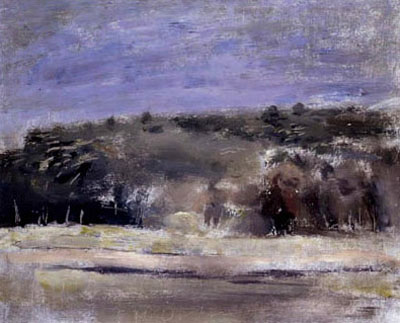
Fairfield Porter on Edwin Dickinson:
Dickinson makes the most out of the least, especially in Winter Woods, Wellfleet, or View of Green Island. Least is, green, flat ground and blue-green sky; or an impression of trees that gives, with trained simplicity, a single essential for landscape, namely, the presence of nature. In these little paintings, or quick ones, he is in touch with an elusive, and fleeting, essentiality. In his large exhibition pieces, he is in touch with not entirely coordinated ideas of art. In the large paintings, he expresses, like an inadequate classicist, the limitations of a formality that originates outside himself; in the small paintings he has been able to surrender to his deepest self which has a profounder form than the form one can know and understand. It is a form that does not impose itself on his subjects, nor is it outside them. Chekhov said he wrote about the inkwell, and in the same way, in Dickinson’s small paintings, there is none of the manipulation of the artist who has lost contact with himself. (Art in Its Own Terms, p. 118-20.)
Monday, December 18, 2006
Solstice (almost)

From a cold night in December... and now a new year. Bundled up in the studio, as if for a Torino winter, pigeons taking refuge under the eves, a thin layer of ice all across Lake Garda... The town of Riva tucked away at the far end, with her winding narrow streets, snow on all the ledges, and looming just behind, the crags of the Dolomiti...
A single swimming float--from the summer--also with a layer of white...
Pripyat

Reading Martin Cruz Smith--Wolves Eat Dogs--his Chernobyl requiem. Arkady finds himself exiled in the Zone, dosimeter at hand, dodging radiation scarecrows. The 26th of April, 1986--an idiot's experiment gone awry--Reactor Number 4 drops drastically in power, the fuel rods freeze in place, hydrogen gas builds to immense pressure, then explodes, blowing the top off the reactor, taking the core up with it. The call to Moscow--denials that anything is wrong--and word comes back, take some iodine, stay indoors for a day or two... But the May Day celebrations go on as scheduled--children of Kiev on parade--a workers' holiday... Breeze blowing down from the north, thyroid damage immediate, other symptoms take longer...weeks, months, years--a lifetime of regret. Could it have been another way? A black village. Samogon, wormwood...
Monday, December 04, 2006
Angels Camp
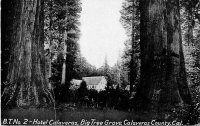
Mining country--along old Highway 49. The goldrush towns--Murphy, Volcano, Mokelumne Hill, brick buildings of imported stature, a Boston cornice, Concord arch--sluices and shutes, all still visible along the higher roads, hillsides giving way to slag, now overgrown, buried, waiting to be reclaimed. The color purple--royalty in ancient times, and beyond--maybe the most artificial of tones, never quite red, never quite blue, but fitting, somehow, as a repository of planted hope. Let it grow over, refurbish, return to earth...
Sunday, November 19, 2006
Rhea
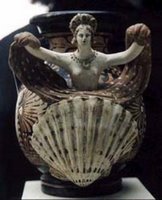
The fullness of her arms, small, delicate breasts--poised above a scallop shell, her shawl revealing the heavens. Arms partially raised, just enough to hold the space, which is regal, like the gesture of the shell itself, both containing and opening at once. Something ancient here, even in the photo, a hand-held camera in some minor Greek museum--the past as if happened upon, re-encountered. That purpose of art--to behold...
Moses, only Moses
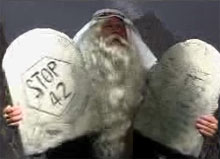
Moses, only Moses--but of course, it isn't Moses. That simulacra of a beard--soft, mid-western yarn--an imitation--and just look at the hands, they're young, too. Where do these things come from? I'm tempted to say, "Don't ask," except that EVERYTHING has already been posted (in the existential sense)--this from someone's political campaign ad, can't recall precisely which one, came up on google--maybe the numbers will tell. Turns out to be in opposition to a minimum wage ammendment to the Colorado State Constitution... This can't be the Moses I know, son-in-law of Jethro, champion of social justice, defender of the people... And yet, and yet, all images up for grabs... There's a u-tube video as well, hilarious-- fake and funny at the same time. "In the mountains of Colorado..."
Charlie Feathers, where are you now?
Thursday, November 09, 2006
Na Wsi

I should really write something about this one, Kasia. In fact, I've been meaning to. Just why it feels--to me, at least--so absolutely Polish. I know that in part it's the off-handedness of everything--music in the countryside, violinist and cows, that ancient accordion, ambiguous figures behind--and a clear sense of late afternoon light. The "student haircut" of the young man seated--his narrow arms, orange shirt--uneven cuffs and scrappy shoes. And then the girl to his right--her narrow build, but taut--the tendons on her neck--and a dark striped skirt straight from Mazowsze... The other fellow alongside, attentive to what's going on--who knows, he might respond in Latin--a medieval madrigal, hand-held drum...
Sunday, October 29, 2006
The Shadow Puppets
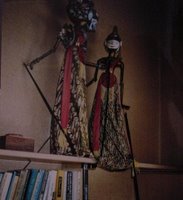
Mauricio sent me this photo--found in his desk drawer--from Fowles Street in Oceanside. The Indonesian shadow puppets--they were on that high shelf in my parents' house for as long as I could remember. Dad purchased them at the World's Fair, in New York--maybe 1964, brought them back for us. It was very much the kind of thing he liked to do--a souvenir, yes, but with something of a higher purpose--a part of the wider world, like the cards--many, many of them--that he'd send me from the museums--the Guggenheim, the Modern, the Whitney--modern museums, the ones of today--how these things could become part of our lives, shared that is... Rememeber pondering his choices--Anuszkiewicz, for instance, or Vasarely--"It's what they're doing, son." A great hope in that--the bounty of the ongoing...
Of course, and more recently it was Colin McPhee's book, A House in Bali--with McPhee's own photographs and stories. Read it last spring. McPhee had listened to Balinese music in New York, maybe 1929--the early gamelan recordings--and knew instantly that this would be the rest of his life. An absolute journey of discovery--the past becoming the present, disappearing at the same time. Priceless in its telling...
Also important--the books below, captured incidentally (as with everything). And the shelves themselves, now with me here, holding songs...
Subscribe to:
Comments (Atom)










)